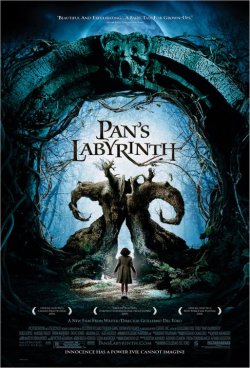 I was struck by something Pan’s Labyrinth writer/director Guillermo del Toro said in an interview: Question: “So often in fairy-tale analysis, there’s a tendency to read any story of a young girl as a psychosexual parable, but this film specifically doesn’t go that way.” Answer: “Not at all. I consciously avoided it, not out of prudishness – though I probably am prudish – but out of the same reason why I tried to avoid the myth of vampirism in Cronos through using the most completely unerotic window I could; I tried to approach it like an addiction. In Pan’s Labyrinth, I knew that the psychosexual angle was really tired; it felt very 1980s for me, and I felt this was a movie about a girl who was on the threshold of making a choice, where she could cease to be a girl, but it was not about sexual identity.” Perhaps he should have told that to the movie’s designers and marketers.
I was struck by something Pan’s Labyrinth writer/director Guillermo del Toro said in an interview: Question: “So often in fairy-tale analysis, there’s a tendency to read any story of a young girl as a psychosexual parable, but this film specifically doesn’t go that way.” Answer: “Not at all. I consciously avoided it, not out of prudishness – though I probably am prudish – but out of the same reason why I tried to avoid the myth of vampirism in Cronos through using the most completely unerotic window I could; I tried to approach it like an addiction. In Pan’s Labyrinth, I knew that the psychosexual angle was really tired; it felt very 1980s for me, and I felt this was a movie about a girl who was on the threshold of making a choice, where she could cease to be a girl, but it was not about sexual identity.” Perhaps he should have told that to the movie’s designers and marketers.
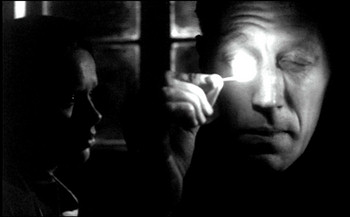 The deaths last week of movie writers and directors Ingmar Bergman and Michelangelo Antonioni have incited all sorts of commentary about the “art” films of yesteryear and the people who made them. Tied up in these discussions is one key assumption: that everyday people think these movies are boring, whether they’ve actually seen them or not.
The deaths last week of movie writers and directors Ingmar Bergman and Michelangelo Antonioni have incited all sorts of commentary about the “art” films of yesteryear and the people who made them. Tied up in these discussions is one key assumption: that everyday people think these movies are boring, whether they’ve actually seen them or not.
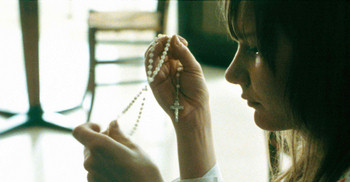 Sometimes the biggest gift a film can give us is to force us back into the real world rather than letting us escape. The German movie Requiem is about demonic possession, yet in spite of its subject matter, it’s a serious, wrenching piece. And because of its subject matter, it’s all the more effective, as the audience isn’t expecting to be challenged.
Sometimes the biggest gift a film can give us is to force us back into the real world rather than letting us escape. The German movie Requiem is about demonic possession, yet in spite of its subject matter, it’s a serious, wrenching piece. And because of its subject matter, it’s all the more effective, as the audience isn’t expecting to be challenged.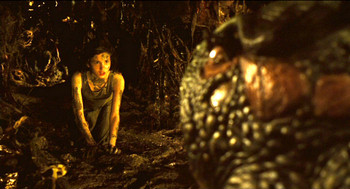 In a
In a  I was struck by something Pan’s Labyrinth writer/director Guillermo del Toro said in an
I was struck by something Pan’s Labyrinth writer/director Guillermo del Toro said in an  This commentary track deals with a handful of themes: the blunt use of color contrasted with the almost tangential way the movie deals with its ostensible theme of liberty; the use of visual and aural cues to indicate the subjective nature of the film; Julie’s progression from isolation to active engagement with the world; and the relationship between the concept of “freedom” and Kieslowski’s obvious interest in responsibility. Plus, I call Juliette Binoche a “two-faced bitch.” How can you resist?
This commentary track deals with a handful of themes: the blunt use of color contrasted with the almost tangential way the movie deals with its ostensible theme of liberty; the use of visual and aural cues to indicate the subjective nature of the film; Julie’s progression from isolation to active engagement with the world; and the relationship between the concept of “freedom” and Kieslowski’s obvious interest in responsibility. Plus, I call Juliette Binoche a “two-faced bitch.” How can you resist? I have no problem
I have no problem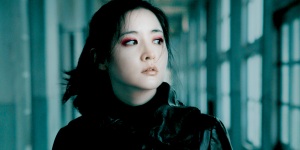 The unfathomably fashionable torture film has spun off a welcome girl-power subgenre, in which determined, attractive young females facilitate the agonizing dispatches of men who have committed atrocities against youth. But two early entries – Hard Candy and Lady Vengeance – are misguided.
The unfathomably fashionable torture film has spun off a welcome girl-power subgenre, in which determined, attractive young females facilitate the agonizing dispatches of men who have committed atrocities against youth. But two early entries – Hard Candy and Lady Vengeance – are misguided.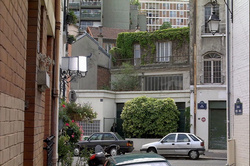 What’s unfortunate about Michael Haneke’s Caché is that the writer/director has created a movie that requires such intensive decoding at its terminals that it’s easy to overlook the rest of the movie – to, in fact, miss its entire point. By spending so much time and effort on the beginning and the ending, we neglect essential questions: What is the film trying to say? Is this an effective way to communicate that message?
What’s unfortunate about Michael Haneke’s Caché is that the writer/director has created a movie that requires such intensive decoding at its terminals that it’s easy to overlook the rest of the movie – to, in fact, miss its entire point. By spending so much time and effort on the beginning and the ending, we neglect essential questions: What is the film trying to say? Is this an effective way to communicate that message?